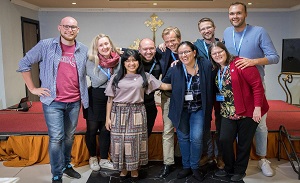Being Lutheran: Lifting up voices of youth
 (LWI) - How can young Lutherans ensure that their views and voices are seen and heard in the church today? How can they move beyond quotas of participation to meaningful leadership at local, national and international level? How can their experiences of faith and theological reflections inform the ongoing process of understanding contemporary Lutheran identity?
(LWI) - How can young Lutherans ensure that their views and voices are seen and heard in the church today? How can they move beyond quotas of participation to meaningful leadership at local, national and international level? How can their experiences of faith and theological reflections inform the ongoing process of understanding contemporary Lutheran identity?
Those were the key questions under the spotlight at the seventh in a series of monthly ‘Being Lutheran’ webinars aimed at highlighting the rich diversity of liturgical, spiritual and theological expressions within the global communion of churches. Four young theologians from Sweden, Poland, Canada and South Africa shared perspectives on issues facing the church in their national and cultural contexts.
Ms Sofie Halvarsson from the Church of Sweden reflected on the implications of Lutheran understanding of the priesthood of all believers. Speaking of her context, where almost 6 million Swedes are members of the former state church, she said it is important not to “lock God into a box” and limit our faith to the Bible or the stories of particular Christian leaders.
Rediscovering lost stories of God
Noting that “the Holy Spirit blows where it wants,” she said it is vital to rediscover the “lost experiences” of women, children or other marginalized people whose stories have never been heard or shared. “If we lose one part of the story about God, we lose a part of the whole story of God,” Halvarsson insisted, adding that this realization profoundly influences the way we interact, respect and respond to the experiences of those around us.
Mr Sebastian Madejski from the Evangelical Church of the Augsburg Confession in Poland spoke of the opposite experience in his country, where the Lutheran church is a small minority in a predominantly Roman Catholic context. He noted that each year, approximately 250 people become members of his church, mostly attracted by the celebration of the Lord’s Supper within the Lutheran tradition.
The challenge is how to make our voice heard and create a more open-minded society.
— Mr Sebastian Madejski, Evangelical Church of the Augsburg Confession in Poland
Liturgy is therefore “a place where the Holy Spirit works and evokes metanoia or a change of life,” Madejski said, adding that the “previous experiences of these converts can also enrich our church too.” As Lutherans, he said, “we share common values but put different emphases on our faith experience.” The challenge, he said, is “how to make our voice heard and create a more open-minded society.”
Reflecting on his work with children in the Evangelical Lutheran Church in Canada, Mr Christopher MacDonald talked about the need to experience the faith through the eyes and ears of children. In the Western Canadian context, he said, “we have a problem of sedentary bodies,” where faith is “stuck in our heads,” yet the Holy Spirit “is a bodily reality which lives and breathes through our own bodies.”
Sharing examples of older people learning from children how to express their faith through movement and dance, MacDonald said children may have “a simplistic understanding but they can sometimes give life to our services.” Reflecting on the relationship of his church with Canada’s indigenous people, he talked about the possibility of returning land to the First Nation inhabitants when it is no longer used by the churches. “How can we engage in fruitful dialogue with those who have been harmed by the church?” he asked.
Moving beyond quotas
Rev. Kagiso Morudu from the Evangelical Lutheran Church in Southern Africa (Cape Church) reflected on the role of young people in his country during the apartheid era and during the more recent #feesmustfall movement to increase access to education. Yet often the voices of youth, women and children are “relegated to the back or not consulted when decisions are being made,” including within the church, he said.
In the South African context, Morudu noted that young people are expected to be a “vibrant” presence through song and dance, while those who raise questions about policies are seen as challenging to church leadership. He spoke about a new project being launched by the ELCSA youth league to survey people in the parishes about their most pressing questions of faith. The project grew out of a series of webinars held during lockdown, he added, where many people described the way they are struggling with their sexuality and what it means to be Lutheran in their African context.
Rev. Dr Chad Rimmer, the Lutheran World Federation (LWF) program executive for Identity, Communion and Formation noted that participation quotas require 40 percent of women, 40 percent of men and 20 percent of youth at all LWF events. “But participation is only the beginning,” he said. “The LWF encourages the theological leadership and contributions of youth and young theologians, in shaping the content and theological reflection of our communion, in governance as well as theological consultations.”
Rimmer concluded, "Young theologians are shaping the theological reflection of our communion, and expanding the richness of our living tradition in significant ways that will bear faithful fruit long into the future."
LWF/P. Hitchen
Source: lutheranworld.org/
